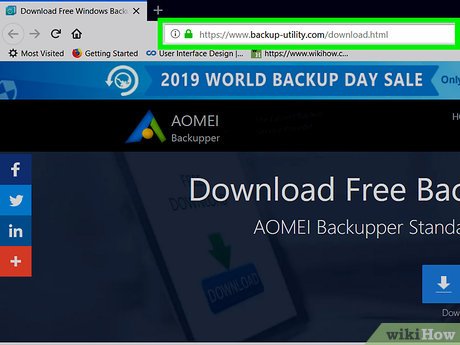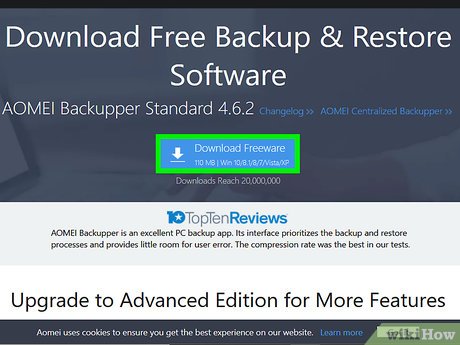How to Move Windows to Another Drive
Part 1 of 3:
Installing AOMEI Backupper
-
 Go to https://www.backup-utility.com/download.html in a web browser. This is the download page for AOMEI Backupper. It's an app you can use to backup and clone your system to another drive.
Go to https://www.backup-utility.com/download.html in a web browser. This is the download page for AOMEI Backupper. It's an app you can use to backup and clone your system to another drive. -
 Click Local Download. It's the second blue button on the right-hand side of the page.
Click Local Download. It's the second blue button on the right-hand side of the page. -
 Click Local Download 1 or Local Download 2. Both options are below the "Local Download" option when you click on it. The AOMEI install file will start downloading immediately.
Click Local Download 1 or Local Download 2. Both options are below the "Local Download" option when you click on it. The AOMEI install file will start downloading immediately. -
 Run the install file. By default, downloaded files can be found in your "Downloads" folder. Most web browsers also allow you to run downloaded files from within the web browser. Double-click "BackupperFull.exe" to install AOMEI Backupper.
Run the install file. By default, downloaded files can be found in your "Downloads" folder. Most web browsers also allow you to run downloaded files from within the web browser. Double-click "BackupperFull.exe" to install AOMEI Backupper. -
 Click Install Now. It's the large blue button that appears when you launch the AOMEI Backupper Install File. This will install AOMEI Backupper.
Click Install Now. It's the large blue button that appears when you launch the AOMEI Backupper Install File. This will install AOMEI Backupper.
Part 2 of 3:
Backing Up Your Hard Drive
-
 Open AOMEI Backupper. It's the app that has a blue icon with an orange and green circle on the front. It's a good idea to backup your drive, in case something goes wrong.[1]
Open AOMEI Backupper. It's the app that has a blue icon with an orange and green circle on the front. It's a good idea to backup your drive, in case something goes wrong.[1] -
 Click Backup. It's in the sidebar to the left of the AOMEI Backupper app.
Click Backup. It's in the sidebar to the left of the AOMEI Backupper app. -
 Click Disk Backup. This will create an image file you can use to recover your system.
Click Disk Backup. This will create an image file you can use to recover your system. -
 Click Step 1. Step 1 is to select a disk you want to backup.
Click Step 1. Step 1 is to select a disk you want to backup. -
 Click the disk you want to backup and click Add. Click the disk(s) you want to backup. The selected disks will be highlighted in green. Click "Add" at the bottom of the app window.
Click the disk you want to backup and click Add. Click the disk(s) you want to backup. The selected disks will be highlighted in green. Click "Add" at the bottom of the app window. -
 Select a destination for the image file (optional). By default, the image file will be saved to C:. If you wish to select a different destination, click "Step 2" and select a destination for the backup image.
Select a destination for the image file (optional). By default, the image file will be saved to C:. If you wish to select a different destination, click "Step 2" and select a destination for the backup image. -
 Click Start Backup. Once you have selected a disk to backup and a destination for the image file, click the orange button that says "Start Backup" in the lower-right corner of the AOMEI Backupper window. If something goes wrong during the cloning process, you can restore your system from this system image.
Click Start Backup. Once you have selected a disk to backup and a destination for the image file, click the orange button that says "Start Backup" in the lower-right corner of the AOMEI Backupper window. If something goes wrong during the cloning process, you can restore your system from this system image.- Read Create and Use A System Image on PC to learn more about how to recover your disk using a system image.
Part 3 of 3:
Cloning Your Hard Drive
-
 Power off your computer. Before installing a new disk drive, or any other hardware, make sure your computer is turned off, unplugged, and that you work on a clean, static free surface.
Power off your computer. Before installing a new disk drive, or any other hardware, make sure your computer is turned off, unplugged, and that you work on a clean, static free surface. -
 Install the new hard drive. To install a new hard drive, you will need a free slot on your motherboard. Connect the power and data cables from the motherboard to the hard drive.
Install the new hard drive. To install a new hard drive, you will need a free slot on your motherboard. Connect the power and data cables from the motherboard to the hard drive.- Read 2 Simple Ways to Install a Hard Drive to learn how to install a hard drive. If you don't have a free slot on your hard drive, you will need to purchase a USB adapter to connect the hard drive externally while you migrate your system.
-
 Turn on your computer. After the new hard drive is installed, boot up your computer by pressing the power button.
Turn on your computer. After the new hard drive is installed, boot up your computer by pressing the power button. -
 Open AOMEI Backupper. It's the blue icon with a green and orange circle on the front. You can launch it from the Windows Start menu.
Open AOMEI Backupper. It's the blue icon with a green and orange circle on the front. You can launch it from the Windows Start menu. -
 Click Clone. It's in the sidebar to the left.
Click Clone. It's in the sidebar to the left. -
 Click Disk Clone. It's the first option in the "Disk Clone" menu.
Click Disk Clone. It's the first option in the "Disk Clone" menu. -
 Select the disk you want to clone and click Next. You will see a list of all recognizable hard drives. Select the one you want to clone and click the button that says "Next". It's the orange button in the lower-right corner of the app.
Select the disk you want to clone and click Next. You will see a list of all recognizable hard drives. Select the one you want to clone and click the button that says "Next". It's the orange button in the lower-right corner of the app. -
 Select the new hard drive and click Next. If the new hard drive is properly installed, it should be recognized by AOMEI Backupper. Click it to select it, and click "Next" in the lower-right corner.
Select the new hard drive and click Next. If the new hard drive is properly installed, it should be recognized by AOMEI Backupper. Click it to select it, and click "Next" in the lower-right corner.- If there is any data on the new hard drive, it will be erased.
-
 Select "Edit partitions on the destination disk". This will give you a few options for partitioning the new drive. It is recommended that you choose "Fit partition to entire disk".
Select "Edit partitions on the destination disk". This will give you a few options for partitioning the new drive. It is recommended that you choose "Fit partition to entire disk".- If you are transferring to a new SSD, you should check "Align partition to optimize for SSD". This will improve the performance of your SSD.
-
 Click Start Clone. This will transfer all the contents of your old hard drive, to the new hard drive.[2]
Click Start Clone. This will transfer all the contents of your old hard drive, to the new hard drive.[2]
Share by
David Pac
Update 04 March 2020





















